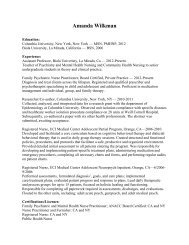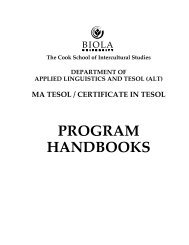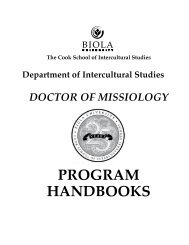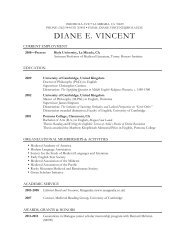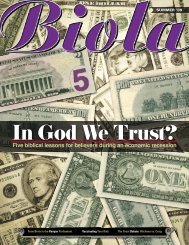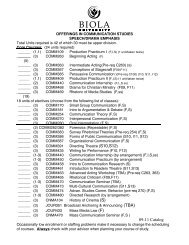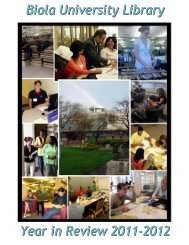A growing number of Christians are embracing the ... - Biola University
A growing number of Christians are embracing the ... - Biola University
A growing number of Christians are embracing the ... - Biola University
You also want an ePaper? Increase the reach of your titles
YUMPU automatically turns print PDFs into web optimized ePapers that Google loves.
Being a Good Steward in a Bad Economy<br />
The summer <strong>of</strong> 2008 was not a pleasant<br />
one for <strong>the</strong> American economy. Gas<br />
prices skyrocketed from one all-time<br />
high to ano<strong>the</strong>r, <strong>the</strong> stock market plummeted at a<br />
pace not seen since <strong>the</strong> Depression and <strong>the</strong><br />
<strong>number</strong> <strong>of</strong> home foreclosures continued to set<br />
records. The credit crunch and housing crisis<br />
continued to stifle <strong>the</strong> slowing economy, leaving<br />
many American families with increasingly little<br />
financial breathing room.<br />
Whe<strong>the</strong>r <strong>of</strong>ficially a recession or not — and<br />
<strong>the</strong> majority <strong>of</strong> polled Americans do label it as<br />
such — <strong>the</strong> economy is certainly on <strong>the</strong> downturn,<br />
and in a climate such as this, tithing and<br />
charitable giving <strong>are</strong> <strong>of</strong>ten <strong>the</strong> first things to be<br />
cut from budgets. But shouldn’t Christian financial<br />
stewardship be <strong>the</strong> same no matter what <strong>the</strong><br />
state <strong>of</strong> <strong>the</strong> economy?<br />
Jim Canning, an associate pr<strong>of</strong>essor <strong>of</strong> fi nan -<br />
ce and management at <strong>Biola</strong>’s Crowell School <strong>of</strong><br />
Business, believes that as Christ ians we <strong>are</strong> called<br />
to honor <strong>the</strong> Lord by giving him <strong>the</strong> first part <strong>of</strong> our<br />
income (Proverbs 3:9), not waiting to see if we<br />
have anything left over.<br />
It’s not about a prosperity gospel, said<br />
Canning, but ra<strong>the</strong>r an expression <strong>of</strong> our love<br />
for <strong>the</strong> Lord and thanks for <strong>the</strong> blessings we<br />
have. <strong>Christians</strong> should trust that God will provide<br />
if we honor him with our giving, though<br />
n<br />
Tips for financial<br />
success in a recession:<br />
l Pay your bills faithfully.<br />
l Prioritize your debt, making sure you don’t<br />
compromise your home or your transportation.<br />
l Negotiate with creditors as needed. Be<br />
proactive.<br />
l Pay extra whenever you can to accelerate<br />
pay<strong>of</strong>f dates.<br />
l Have part <strong>of</strong> your paycheck automatically<br />
transferred to a savings account.<br />
l Keep some money in a secure emergency fund<br />
for unforeseen expenses.<br />
l Discipline yourself to use cash ra<strong>the</strong>r than<br />
credit cards.<br />
l Control spending on non-essentials.<br />
l Have a garage sale to generate extra cash to<br />
pay down debt or to increase savings.<br />
l Cancel cable/satellite or o<strong>the</strong>r superfluous<br />
monthly expenses.<br />
obviously we still have to use<br />
judgment, especially when times<br />
<strong>are</strong> tight.<br />
“It’s easy to be a good steward<br />
when things <strong>are</strong> plentiful,” said<br />
Canning, “But in hard economic<br />
times, a steward just has to be wiser<br />
with <strong>the</strong>ir money.”<br />
There <strong>are</strong> many practical ways<br />
that <strong>Christians</strong> can manage <strong>the</strong>ir<br />
money wisely in <strong>the</strong> midst <strong>of</strong> a constricting<br />
economy. Most im por -<br />
tantly, said Canning, is <strong>the</strong> elimination<br />
<strong>of</strong> credit card debt. Most<br />
Americans spend more than <strong>the</strong>y<br />
make, purchasing things with credit<br />
cards and worrying about it later,<br />
but this kind <strong>of</strong> debt can accumulate<br />
quickly and is very costly.<br />
Canning suggests that an easy<br />
way to eliminate credit card debt is<br />
simply to discipline oneself to use<br />
cash whenever possible. The aver -<br />
age person who typically uses a<br />
credit card will spend 34 percent<br />
more than <strong>the</strong> person who typically<br />
uses cash, he noted.<br />
But in addition to trimming ex pen ses<br />
and cutting down on debt, it is also smart to<br />
wisely invest whatever surplus money one<br />
does have.<br />
One <strong>of</strong> <strong>the</strong> wisest investments someone can<br />
make is to sign up for a retirement plan —<br />
whe<strong>the</strong>r a 401(k) or a 403(b) — that <strong>the</strong>ir company<br />
is <strong>of</strong>fering, especially if <strong>the</strong>re is a company<br />
match involved, said David Little (’93), vice<br />
president <strong>of</strong> Eclectic Associates, a financial planning<br />
firm in Fullerton, Calif.<br />
O<strong>the</strong>r smart ways to use surplus money<br />
include paying down debt, opening a Roth IRA or<br />
establishing an education fund for children.<br />
It is also important to not let charitable giving<br />
and church tithing fall to <strong>the</strong> wayside during<br />
tough economic times, Little said.<br />
As a financial planner for 15 years, Little<br />
said he sees clients’ tax returns and is constantly<br />
amazed at <strong>the</strong> high salaries and “woefully low”<br />
amounts <strong>of</strong> giving, even among <strong>Christians</strong>. To<br />
him, giving to <strong>the</strong> church or o<strong>the</strong>r Christian<br />
organizations is a crucial part <strong>of</strong> stewardship.<br />
Canning agrees, suggesting that <strong>Christians</strong><br />
should seek God’s wisdom and pray about where<br />
to give <strong>the</strong>ir money. Resources like <strong>the</strong> Evan -<br />
gelical Council for Financial Accountability<br />
(www.ecfa.org) can also help guide <strong>Christians</strong><br />
in wise charitable giving.<br />
“Investing in <strong>the</strong> Lord’s work is investing in<br />
eternity,” said Canning. “Giving to <strong>the</strong> Lord is<br />
one <strong>of</strong> <strong>the</strong> wisest investments you can make.”<br />
How much we can give, however, is largely<br />
dependent on how we manage our finances, and<br />
Canning and Little agree that it all comes back to<br />
self-discipline and prudent planning for <strong>the</strong><br />
future, living like <strong>the</strong> diligent ant in Proverbs 6:6.<br />
“In times like <strong>the</strong>se we learn <strong>the</strong> lesson,”<br />
said Little, “that reckless use <strong>of</strong> our money in<br />
good times can reap very negative consequences<br />
when times get tough.”<br />
The best advice for how to deal with a recession,<br />
<strong>the</strong>n, is perhaps to just be ready when it<br />
comes. Good stewardship with our money, after<br />
all, is something we should always aspire to, not<br />
just when <strong>the</strong> economic push comes to shove.<br />
– Brett McCracken<br />
F A L L ’ 0 8 1 5



